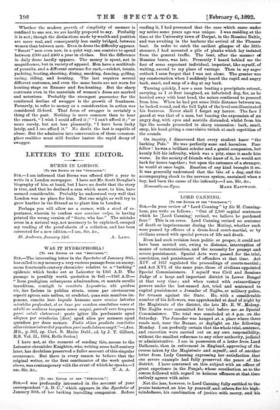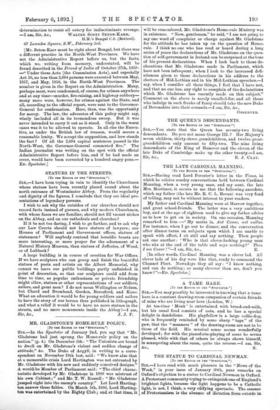LORD CANNING.
[To THE EDITOR OF TER "SPECTATOR."] Six, In your review of " Lord Canning" by Sir. H. Cunning- ham, you write as follows : "Out of 2,500 capital sentencee, which he [Lord Canning] revised, we believe he pardoned. four." This is an error. Lord Canning revised no sentence of death or imprisonment during the Mutiny, whether such were passed by officers of a drum-head court-martial, or by civilians armed with special powers of life and death.
Even. bad. such revision .been ,politic. or proper, it .could not have been carried out, owing to distance, interruption .of means of coraraunication, and the necessity for prempt.and severe, punishment. Special Acts were ,passed for the. trial,. conviction, and punishment of offenders at that time. Act XIV. of 1857 regulated the proceedings of courts-martial ;_ and Act XVI. of the same year,-those of civilians:appointed Special Commissioners. I- myself was Civil and Sessions- Judge of a large and important district in Lower Bengal at that very time; and when vested with extraordinary powers under the last-named Aet, tried and sentenced to capital-punishment a .Jemadar of Najibs, or military police,. for treason against the State. He, with a .considerable number of his followers, was apprehended at dead of night by the Magistrate of the district, the late Mr.. E. W. lifolorly.. The . Najibs were committed for trial before . as Special Commissioner. The trial was concluded at..4 pin. on the Saturday. The Jemadar was hanged .at . a place where three- roads met, near the Bazaar, at daylight on the following Monday. I am perfectly certain that the-whole trial, sentence, and execution were carried out on my own responsibility, without the smallest reference to any other authority, judicial. or aaministraive. I am in possession of a letter from ,Lord Dalhow3ie, then in • retirement in ,England, approving of the- course taken by the Magistrate and myself; and of another- letter from . Lady Canning expressing her satisfaction that one severe -example had fully ,preserved the peace of the district. I have conversed on this subject with an officer of .great experience in • the Punjab, whose recollection as to the course. followed with regard to heinous offences at that time entirelyagrees with mine.
Not the less, however, is Lord Canning fully entitled to the praise bestowed on him by yourself And others for his high- mindedness, his combination of justice 'with mercy, and his determination to resist all outcry for indiscriminate revenge.
—I am, Sir, &c., WALTER SCOTT SETON-HARR, 11.11.'s Bengal C.S. (Retired).
'67 Lowndes Square, S.W., February 3rd.
[Mr. Seton-Karr must be right about Bengal, but there was a different practice in the North-West Provinces. We have not the Administrative Report before us, but the facts, which we, writing from memory, understated, will be found described in the Friend of India of October 27th, 1859 : —"Under these Acts [the Commission Acts], and especially Act 16, no less than 2,694 persons were executed between May, 1857, and May, 1858, in the North-West Provinces. The number is given in the Report on the Administration. Many, perhaps most, were condemned, of course, for crimes anywhere -and at any time—murder, fire-raising, and highway-robbery- many more were, however, for crimes against the State, and -all, according to the official report, were sent to the Governor- General for confirmation. Here, then, was the opportunity for mercy. The law, the advocates of this policy might say, wisely included all in its tremendous sweep. But it was never intended to carry it out as it stood. Only in the worst eases was it to be allowed to operate. In all else the Execu- tive, as under the British law of treason, would secure a reasonable lenity. We accept the supposition, and how stands the fact ? Of all the 2,694 capital sentences passed in the North-West, the Governor-General commuted five." The Indian journalist was writing on the spot with the official Administrative Report before him, and if he had made an error, would have been corrected by a hundred angry pens.— En. Spectator.]







































 Previous page
Previous page